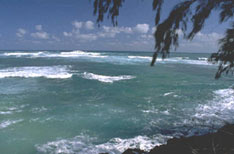| |
 |
 |
PUTTING WATER ON A SALT-FREE DIET
Is Desalination the Solution to Our Increasing Freshwater Shortages?
|
|
Whoever designed the human body seems to have messed up! We must drink fresh water, but fresh water makes up less than 3% of the H2O on the planet—and much of that is tied up in glaciers and ice caps.
 The salty water in the oceans and seas makes up the rest of the planet's water. Waiting for global warming to melt the polar ice caps definitely isn't a sensible way to solve the planet's ever-increasing freshwater shortages, so some areas are turning to desalination, which generates fresh water from salt water.
The salty water in the oceans and seas makes up the rest of the planet's water. Waiting for global warming to melt the polar ice caps definitely isn't a sensible way to solve the planet's ever-increasing freshwater shortages, so some areas are turning to desalination, which generates fresh water from salt water.
There is a nearly inexhaustible supply of salt water on the planet, but turning it into fresh water is still an expensive proposition. But as demand for fresh water rises and outstrips supply, the cost of getting fresh water from traditional sources—rivers, lakes, groundwater—goes up. Getting water from desalination plants is becoming more economically competitive. The municipal water supply for many Caribbean islands and Arabian Gulf states already comes mainly from desalination.
So, is desalination the magic bullet for water shortages? Not really. In addition to the cost of removing the salt from the water—it's still roughly three times more expensive than supplying natural fresh water—consider the following drawbacks:
- Salinity rise: The leftover concentrated salt water is injected back into the ocean, causing the local salinity to rise, which can create problems for some ocean creatures.
- Chemical pollution: Chemicals must still be used to pre-treat the source water, and de-fouling chemicals must be used to clean and remove organisms from the reverse-osmosis system.
- Energy use: Desalination is energy-intensive—much more so than pumping available fresh water—so more electricity is needed, causing more pollution from electric power plants.
- Logistics: Desalinated water is currently only practical and affordable for municipalities relatively near a source of salt water.
The global demand for fresh water makes increased use of desalination plants seem almost inevitable. There are, however, other measures that can help us make the most of our natural freshwater supplies and minimize the future economic and environmental costs of desalination:
- Water conservation: Using water wisely on an individual basis and at the community level reduces the overall demand for water and more closely aligns water needs with natural freshwater supplies.
- Pollution avoidance: As pollution contaminates more and more freshwater sources, we bear higher treatment costs for partially contaminated sources and lose some badly contaminated sources altogether. Some of the most common sources of contamination are aging sewage-treatment plants or failing septic systems; pesticide and fertilizer runoff from farm fields and homeowners' lawns; and polluted runoff from highways, streets, and parking lots.
|
|
Now, relax and imagine you're drinking a delicious margarita... but without the lime juice, triple sec or tequila. Mmm... briny. Of course, shortages of fresh water will never quite come to that, but being nice to our freshwater supplies will help us avoid future water shortages and reduce the need for desalination.
|
|
OIL & WATER & SALT DON'T MIX |
|
After the First Gulf War, the ground in Kuwait was left scarred by pools of oil from destroyed oil wells and by particulate matter that settled out of the smoke-filled air. Also contributing to the long-term environmental problems: the salt that remained on the ground from the seawater used to extinguish the well fires.
|
|
|
|

For more reviews or purchase info, click on any title to go to Amazon.com
| |
 |
Seawater Desalination
Impacts of Brine and Chemical Discharge on the Marine Environment
Are population growth, higher living standards, and increasing demand from industry and agriculture doomed to outpace the supply of fresh water? Get a primer on desalination and its environmental impact.
(by Sabine Lattemann and Thomas Hopner, Apr-2003)
|
| |
| |
 |
Every Drop for Sale: Our Desperate Battle Over Water
Will easy access to fresh water become a luxury? This overview of the future of freshwater resources predicts that water will become a commodity controlled multinational corporations, population growth will far outpace water supplies, and water will be the fulcrum on which 21st century global politics balances. (by Jeffrey Rothfeder, Oct-2001)
|
| |
| |
 |
Water Wars: Privatization, Pollution, and Profit
Do we all have a right to plentiful, low-cost fresh water? With population and usage growing and water being used at unsustainable rates, some corporations see water as a potential source of profits. The author provides ideas on how we can avoid a water-poor future.
(by Vandana Shiva, Jan-2002)
|
| |
Or see more Books for a Better Planet
|
Back to joke page | More articles, by category
FREE AUDIO CLIPS

|
|
|
|
|
Hey, we don't pick
the Google ads! – GP
|
| |
| CLICKS ON OUR ADS AND PURCHASES VIA OUR AMAZON LINKS HELP SUPPORT THIS FREE SITE... THANKS! |
|
|
"Society, my dear, is like salt water, good to swim in but hard to swallow."
— Arthur Stringer,
The Silver Poppy
|
|


